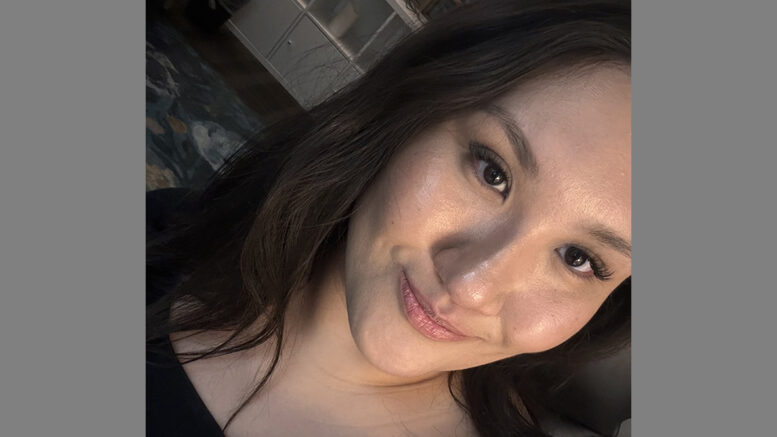By Laura Mushumanski, Local Journalism Initiative Reporter
(ANNews) – Tishina Shannacappo feels a lot of strength from the support that her parents provided during her educational journey. “They really didn’t interfere in what I wanted to do and how I wanted to do it,” she explains. “There were definitely strong words of advice, but a lot of the work that I do, especially going forward, is in honour of the sacrifices that [my parents] both made. They poured a lot of energy into me as a child with reading, giving me the gift of literacy and education.”
Most of Shannacappo’s life was spent as an urban Anishinaabe/Metis person in Winnipeg, Manitoba, but she left her home community and moved to Calgary in 2023 to pursue further clinical training within her psychology practice. “There were some barriers in Manitoba when it came to registering as a provisional certified school psychologist – it was more feasible to secure the type of work I wanted to do, here,” shared Shannacappo. Going into doctoral studies is a huge time and financial commitment. In the process, she started to build connections with her new community and hear Indigenous stories about how others wound up in Calgary.
“I had always been interested in therapy and psychology, primarily as a client when I was a teenager. I wasn’t sure what I wanted to do, I wasn’t in it to make money. I moved to Vancouver when I was 18 and did a Gender Studies degree at UBC; after I graduated, there wasn’t much opportunity for a standard career… I was always very people focused, and ended up moving back to Winnipeg once I graduated… I worked in an education resource centre for about 10 years…I was editing different books and stories – all of that was very story driven,” explained Shannacappo.
“Once I felt ready closer to the end of my 20s, I decided to pursue a masters degree in psychology…It was very assessment focused which is against what I studied and believed as an Anishinaabe…It was something that was pushed forward by the organization I worked with and I continue to be grateful towards them for their support and vision to train First Nations in the area of school.”
For the next two years, after obtaining her master’s from the University of Calgary, Shannacappo worked as a rural school psychologist across the province, where she focused on working with Manitoba First Nations community members, hearing people’s stories, working with families and introducing psychology services in the best way that she could.
“For me, being a teenager who had to access different services in terms of therapy [and] youth support I had an idea of what I didn’t like. I remember feeling very hesitant to be judged and also to be turned into a statistic. I remember feeling that very strongly.”
In her work with clients today, whether they are Indigenous or not, she tries to “bring forth some of that vulnerability I felt and understanding of them” in building a relationship and rapport.
Shannacappo noticed how important it was to establish relationships within therapy. She grew her practice on how she would like others to treat her, “a relationship [with a client] would be built over multiple meetings together, the time we would spend together would be focused on them. My understanding is I wouldn’t push them too much but be as honest as I can about my limitations, what I could do as a professional, and create a lot of space for humor and fun.” Being initially hired as a cultural support, Tinisha was curious why she had this role, sharing, “for me as an urban Anishinaabe, I don’t have a lot of traditional teachings. The way that I think and the way that I move in the world was very much what my family believed in, both the Metis side and also the First Nation side. I don’t necessarily have a lot of traditional knowledge, instead its [simply] how I interact with youth and people.”
Within a 50-minute therapy session with Shannacappo, she engages with both Indigenous and non-Indigenous people in a space to have meaningful conversations by fitting relationality and connection into her practice. “[An Indigenous] type of framework that a lot of people have doesn’t fit within [a Western] structure,” she says. “As a practitioner, sometimes it feels limiting to me to have to work in that way, eventually I hope to work more in community while infusing as much of the ethos that I know and like to work from.”
The ethos that Shannacappo walks with stems from the understanding of humility, sharing with us that, “even looking at my last name, Shannacappo, it means ‘they who stand back watching’….There’s this observational piece of me that I feel is inherent in how I think and work with people, so the humility, the observation, plus do as little harm as possible while respecting a person’s agency within the process.”
These are the principles, values, and ways of knowing that Tishina brings into her practice, Heart Berry Psychology in Calgary that can be accessed both in-person and virtually.
Heart Berry Psychology derives its name from “ode’imin” of the Anishinaabe language, representing a strawberry plant with a wild, complex root system. Ode’imin embodies sweetness, bitterness, and juiciness, with resilient roots deeply entwined in the earth, symbolizing a life-giving force. It symbolizes our heart and its integration into all aspects of our being and actions



Be the first to comment on "The Gifts of Literacy and Education – with Tishina Shannacappo"